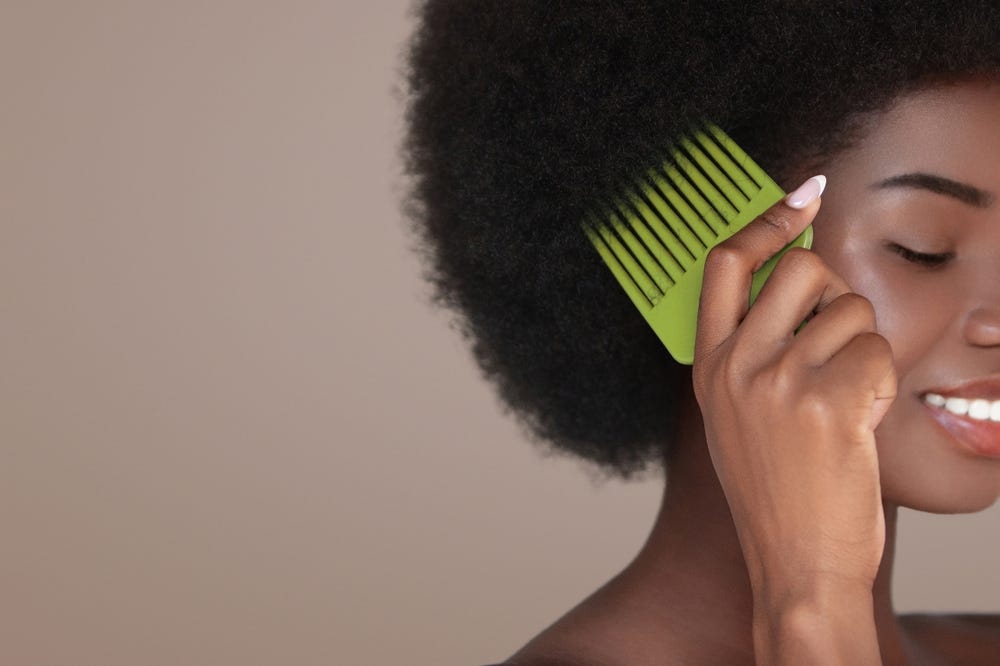Big Hair Energy: A Non-Hormonal Pill Could Finally Make Balding Optional
When it comes to oral hair loss medications, the landscape has remained pretty stagnant over the last few decades. Sure, we’ve seen a few new contenders pop up here and there, but the big players like finasteride and minoxidil continue to dominate the scene.
These medications have been around for ages, and while they work for some folks, they don’t offer a solution for most. Many still find themselves grappling with side effects or lackluster results, which can be frustrating. Plus, with the rise of more natural and holistic approaches, some are questioning whether traditional meds are really the way to go. But these alternatives typically lack scientific evidence, regulatory limitations and commercial viability, only to leave people navigating familiar, if not a bit stale, prospects.
It feels like the search for a revolutionary hair loss treatment is a never-ending endeavor. And sometimes, it’s difficult to imagine that we will ever witness a major breakthrough in this field, but at last, there’s some exciting news.
We may actually be on the verge of a breakthrough!
A new version of oral minoxidil is in the pipeline - and it could potentially shake things up for how hair loss is treated. It’s a bit of a waiting game right now, but if this new formulation lives up to the hype, we could see a major shift that offers hope to the 80+ million Americans looking to regain their self-confidence.
Last week, Allure reported that Veradermics, a biopharmaceutical company, made headlines when it announced it has secured funding to move forward with phase three trials for its groundbreaking drug, VDPHL01, a first-of-its-kind, non-hormonal oral solution for hair regrowth for both men and women.
At the moment, people seeking solutions for hair loss often turn to topical minoxidil, commonly known by its brand name Rogaine, which is specifically formulated for this purpose. However, oral minoxidil is approved by the FDA solely for managing high blood pressure, leading many physicians to prescribe it “off label” for hair loss - a practice that has gained traction in recent years.
Interestingly, the demand for oral minoxidil has even prompted online retailers like Hers to offer it in gummy form, making it more accessible to consumers. But with VDPHL01 on the horizon, the potential for a more effective and convenient hair regrowth option could soon become a reality for those affected by hair loss and the medical community alike.
Still, while oral minoxidil has certainly shown its effectiveness in promoting hair growth, it isn’t necessarily the best option compared to its topical counterpart, largely due to the potential for systemic side effects such as cardiovascular complications, fluid retention, and excessive unwanted hair growth. Dr. Reid Waldman, a board-certified dermatologist and CEO of Veradermics, highlights this issue, explaining that the way oral minoxidil is absorbed can lead to rapid spikes and drops in blood pressure.
“Minoxidil comes into the body very rapidly. It spikes, and then it goes away, because it wants to rapidly lower your blood pressure. Great for blood pressure; not ideal for treating hair loss,” he told the beauty publication.
He continued: “We saw an opportunity to take this ingredient that we recognize works for hair growth and optimize it for oral administration, hair growth, and cardiac safety by changing the way in which it interacts with your body.”
Waldman also explained that VDPHL01 is designed to release minoxidil more steadily, which would not only provide longer-lasting support for hair follicles but also help avoid the sudden spikes in blood pressure that could lead to serious issues. This means that with VDPHL01, you can expect better hair growth results without the added health concerns that often come with oral minoxidil.
This advancement could be a life-altering for those looking for effective hair growth solutions while prioritizing their overall well-being.
“Nothing, nothing has been new in the field of androgenetic hair loss for almost three decades,” says Jerry Shapiro, a board-certified dermatologist and professor of dermatology at New York University, who also advises Veradermics. (Androgenetic alopecia is also known as male and female pattern hair loss.) “I’m excited that there’s something new, and also something [approved] for women, because there was really nothing except for topical minoxidil… and we need more things for women that are effective and that are approved by the FDA.”
Shapiro is pointing to a marked gap in the hair loss treatment space, where there are currently no universally approved oral medications suitable for all genders. Take finasteride, for example; it works by blocking DHT, a hormone closely associated with hair loss in both men and women. But there’s a catch - many physicians are wary of prescribing it to women of childbearing age due to the risk of birth defects. On the flip side, men using finasteride have reported side effects like erectile dysfunction and diminished libido, casting a shadow over its benefits. Moreover, some research indicates that finasteride may not be as effective for women, making treatment options more complicated.
While oral minoxidil has emerged as another option and some users have experienced positive outcomes, the reality remains that there’s a pressing need for safer and more effective alternatives. As it stands, individuals grappling with hair loss often find themselves navigating a tricky path, balancing potential benefits against the risks associated with current medications. It’s a situation that underscores the necessity for ongoing research and innovation to broaden the spectrum of effective hair loss solutions that can cater to everyone, regardless of gender.
For now, patience is a virtue. VDPHL01 just kicked off its phase-three trials and while the excitement is palpable, we’ve got a bit of a wait ahead. Veradermics is eyeing a New Drug Application submission in 2027 and once that’s in, the FDA typically takes about 10 to 12 months to give it the green light. So, for those of us eagerly anticipating a solution to hair loss, there are still a few years and some lingering questions before VDPHL01 - likely sporting a snazzier name by then - becomes available. But here’s the silver lining: dermatologists in the know are optimistic about its potential and they believe the wait will be well worth it.
So, while the timeline could feel like an eternity, hang tight; what might seem like a slow crawl now could soon turn into a sprint towards effective therapy that can not only restore hair but also boost confidence.
“It looks very, very promising that it works quicker in terms of the swiftness of the response and the hair density, Shapiro said. “We finally have something that really works.”




